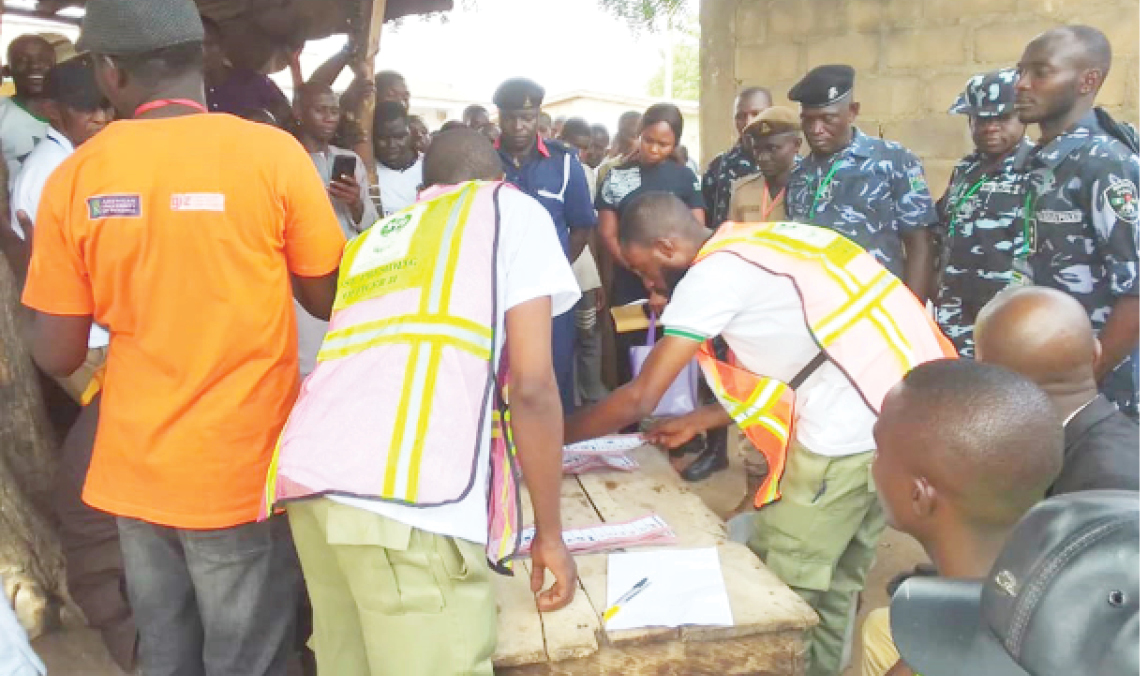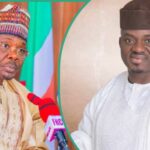The Chairman National Peace Committee (NPC) and former Head of States, Gen. Abdulsalami Abubakar (retd), Convener Bishop Matthew Hassan Kukah, and other members of the committee have listed why the 2023 general elections recorded low voter turnout than expected.
They spoke on Friday at the formal presentation of the NPC’s 2023 General Elections Report in Abuja.
President Bola Ahmed Tinubu defeated former Vice President Atiku Abubakar, Peter Obi, and a dozen of candidates to win the keenly contested election.
Daily Trust reports that out of the total 93.47 million registered voters, only 24.9 million persons voted in the 2023 presidential and National Assembly elections.
- Anambra: Ceremony Turns Bloody as Gunmen beat up organisers, Kidnap 8
- ‘It’s laughable’, Obasanjo speaks on controversial Igbo roots
This represents a 26.72 percent voter turnout, the lowest since the return to democracy in 1999, compared to the voter turnout of 34.74 percent in the 2019 general election, thus the 2023 elections turnout declined by 8.03 per cent.
Rev. Atta Barkindo, Head of Secretarial of the NPC, who spoke on the contents of the report said that one of the issues is of lack of compliance with policies and guidelines and legal frameworks of the elections.
“There is also the issues of trust deficit, and that is why we can see those interest in voter registration. But the voter turnout was a bit low.
“And we also observe citizens limited political awareness across the country. And there are challenges with issues of technology and then how poverty and dispossession eventually impacted on credible process of the elections,” Barkindo said.
He said that this was why the peace committee provided certain recommendations that both INEC and other election management bodies should take very seriously going forward.
He said, “One is the issue of whole society approach. So all of us must be involved in the process to provide free, fair and credible elections. There should be certain responsibilities for the government in power, particularly, changing social economic conditions to make people to be committed to the electoral process.
“And for the election management body (INEC), there are issues where they have to comply with certain guidelines that have been set in place.
“And the changing political party culture of our country, where political parties are called upon to just comply with their own constitutions, their own policies and their own guidelines.”
Elections, security officials fail Nigerians
Speaking further on the trust deficit, the report noted that throughout the 2023 election cycle, the increase in voter registration did not translate into voter turn out on the election day as both the government and the election management body promised to deliver a free, fair and credible elections.
It said, “President Buhari made this assurance during his speech at the 2nd signing of the Peace Accord on 18th February 2023. The INEC Chairman assured many Nigerians of free, fair and credible elections. Security agencies were determined to comply with rules of engagement and keep citizens safe.
“But when it mattered, officials across different agencies failed to comply with laws, policies and the guidelines already put in place.
“All these, as in previous elections, combined to influence the perception of citizens who questioned the neutrality, impartiality and the objectivity of election management bodies.
“Due to trust deficit, the turnout in the just-ended 2023 presidential elections was a paltry 29 percent, down from 69 percent in 2003 and 53 percent in 2011.
President Tinubu secured his victory with the support of less than nine million voters out of the total 93 million registered voters, granting him the mandate to govern a nation of more than 220 million people.
“This outcome highlights a significant trust deficit and voter apathy within the country. It is imperative to take measures to restore the trust and confidence of citizens in the electoral process,” the report said.
Daily Trust also reports that the INEC Chairman, Prof. Mahmood Yakubu, earlier briefed the NPC on the preparation for the forthcoming Edo and Ondo states governship elections scheduled for and 16 November 2024, respectively.
He assured of the commission’s readiness, with security agencies and other stakeholders to ensure the success of the elections.

 Join Daily Trust WhatsApp Community For Quick Access To News and Happenings Around You.
Join Daily Trust WhatsApp Community For Quick Access To News and Happenings Around You.


